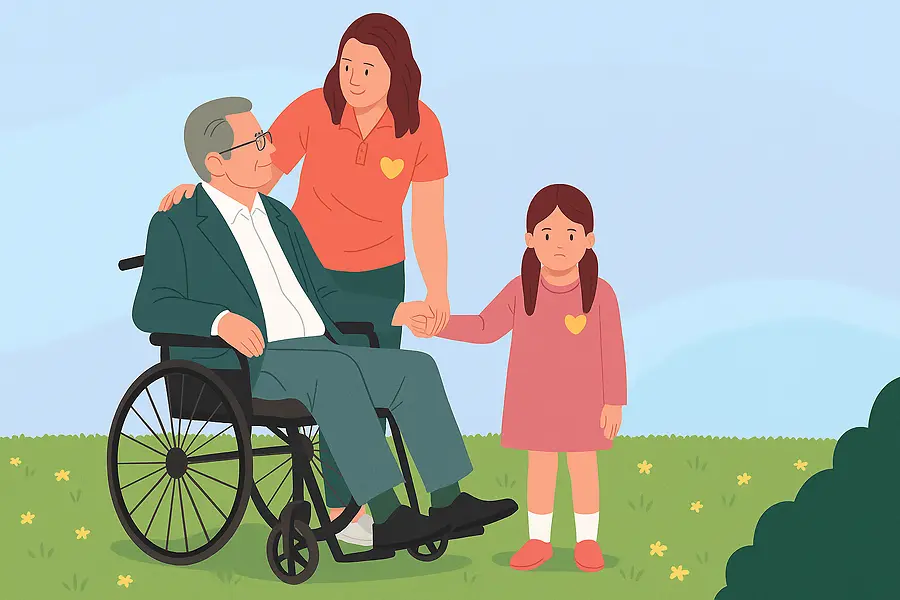When Strong Women Need Strength:
Why Recognizing Care Options Matters

Let’s be honest: in most families, it’s the women—wives, daughters, sisters—who end up shouldering the caregiving role. It’s an act of love, but it can also become an overwhelming burden. Balancing late-night caregiving after a full workday, keeping up with household responsibilities, and navigating healthcare needs often leaves women stretched so thin that their own health and careers begin to suffer.
And yet, so many of us stay silent, believing “this is just what women do.” But what if we started asking: at what cost?
The Toll on Women Caregivers
Statistics make clear what many women already feel in their bones. Women make up about 75% of family caregivers in the U.S. (Family Caregiver Alliance). Of those, more than half spend 20 or more hours per week caregiving—the equivalent of a part-time job layered on top of everything else.
The physical strain is undeniable. A study of caregivers for adults with multiple sclerosis found that 31% reported physical injuries from caregiving tasks and nearly half experienced physical exhaustion (National Library of Medicine). Lifting, transferring, and even the emotional stress of caregiving can cause lasting damage. Health impacts go beyond injuries. Women caregivers report higher rates of anxiety, depression, weakened immune systems, and even heart disease compared to non-caregivers. Caregiving isn’t just demanding—it can become dangerous when women neglect their own well-being.
The Career Penalty
Caring for a loved one also affects women’s professional lives. According to the U.S. Chamber Foundation, 60% of caregivers balance a career with caregiving, yet in 2023 alone, 1.9 million women over 55 left the workforce for caregiving—seven times more than men. Many women cut back on hours, decline promotions, or leave jobs entirely. This is often called the “care penalty”—and it has lifelong implications. Stepping away from work can mean lost income, reduced retirement savings, and diminished career advancement. For women who already face a gender pay gap, caregiving widens that divide.
The Sandwich Generation Strain
For many women, the challenge is twofold: raising children while also caring for aging parents. This is known as the sandwich generation. Women make up about 60% of this group, and they spend, on average, 45 minutes more each day caregiving than men.
Imagine finishing a full day at the office, heading home to homework and bedtime routines, and then shifting gears to help a parent bathe, manage medications, or calm nighttime confusion. The emotional and physical exhaustion is relentless. Nearly half of mothers in this group report leaving jobs because of these dual roles. And while they may call it sacrifice, the truth is that many feel trapped—with few realistic options or support.
Burnout Is More Than Being Tired
Burnout is not just about feeling drained. It’s about hitting a breaking point. Research shows 32% of caregivers report high levels of burden, often marked by depression, anxiety, sleep disruption, and worsening chronic health conditions. For women, burnout is compounded by cultural expectations—to be the nurturer, the “fixer,” the one who never drops the ball. But we can’t pour from an empty cup.
Why Awareness of Senior Care Options Matters
One of the most empowering steps women can take is to know their options early. Too often, families only start researching care when they’re already in crisis—a fall, a hospitalization, or caregiver collapse. There is panic and they jump to making a decision without looking into all of the option. There are so many more choices available than a traditional assisted living or a nursing home. Other options to explore are residential assisted living, memory care, adult day services, or home care support. Researching all of the options before the crisis can give women the chance to make proactive choices rather than reactive ones. At places like The Geneva Suites, a residential assisted living, families find an alternative when assisted living isn’t enough, but a nursing home feels too impersonal. Small homes with high staff ratios allow women caregivers to breathe again—knowing their loved one is safe, supported, and treated with dignity.
A Call to Women Caregivers
If you are in the thick of caregiving, here are a few reminders:
- You are not failing by needing help. You’re human.
- Your health matters too. You can’t care for others if you’re broken down yourself.
- Start conversations early. Don’t wait until a crisis forces rushed decisions.
- Lean on resources. Explore care options, support groups, and respite services before burnout sets in.
Because caregiving should not mean losing yourself. It should mean building a support system that allows you to show up with love—without sacrificing your health, career, or identity.
Women are powerful, resilient, and resourceful. But even the strongest women need strength from others. Knowing the care options available isn’t just about your loved one’s quality of life—it’s about yours too.


